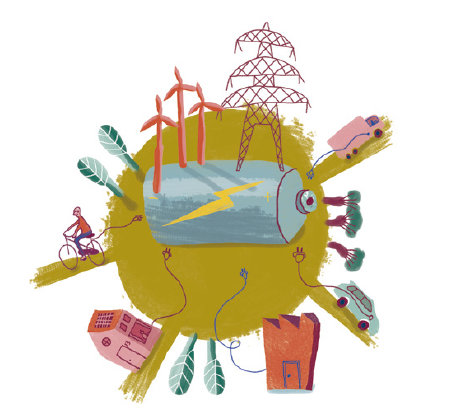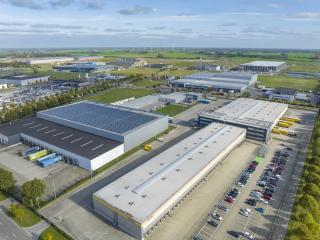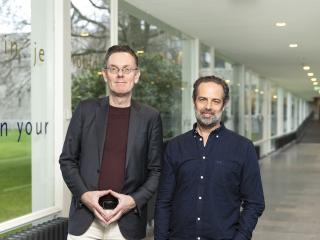The energy transition as a social challenge: “This will only succeed if everyone sees the necessity”
At the university-wide Academic Collaborative Center for Climate & Energy, researchers from different disciplines join forces with social partners that possess knowledge about the energy sector, to look for solutions for the energy transition. Grid operators, for instance, are perfectly willing to place batteries to relieve pressure on the overburdened power grid in the Netherlands, but that’s not so simple given current regulations. Competition law expert Jasper van den Boom came up with a new construction that would allow for this. “We have to change the way we think,” he says. “The energy transition requires collaboration and coordination.”
The energy transition is one of the greatest challenges our society must overcome in the decades ahead, Jasper van den Boom believes. He became fascinated with the theme after completing a PhD on the regulation of digital markets.
The energy transition is so multifaceted that collaboration between a range of private and public parties is a must
The energy transition is so multifaceted that collaboration between a range of private and public parties is a must. The roles of many of them are changing, but how exactly isn’t always clear due to the complexity of the process. Take the Netherlands’ overburdened power grid. An obvious way to address some of these problems in the short-term would appear to be storing power in batteries. But that’s easier said than done: battery storage is often not profitable when it’s used to relieve pressure on the power grid, whereas using batteries in a profitable manner can actually aggravate the problems on the grid. Applicable legislation often works to slow things down, instead of speeding up the energy transition like it should. How can that be?
“In the nineties, there was a liberalization movement. The energy sector was privatized as much as possible,” Van den Boom explains. “To create economical efficiencies, introducing competition and independence at different levels of the value chain were made top priorities. Now, however, the energy transition actually requires collaboration and coordination. Many of the existing rules that demand competition and independence function as obstacles to adapt to a new reality.”

The energy transition really is a social transition
Changing roles
Fortunately, this is right up his alley. How does one regulate uncertainty? And how do you get the legislator to let go of existing principles? These are questions that intrigue him. Working together in the Academic Collaborative Center is a good way of answering them, he tells us: “You work in an interdisciplinary context and with organizations, so you hear a lot of things you wouldn’t naturally come across in literature. For example, our work sessions revealed that grid operators would love to make a change, but they don’t always know how to. Their role is changing: Instead of just facilitating, they also need to coordinate and set priorities, for example by giving priority to connect certain organizations to the energy grid or by concluding group contracts. This goes against their neutral role. But they can’t take the required political decisions. This shows you that the energy transition really is a social transition.”
The fact that the private and public domains are increasingly coming together is something Van den Boom had already seen in the digital world. For instance, companies and services must make sure their data is safe, because if essential services are hacked we as a society have a huge problem. And that doesn’t only apply to those services or companies themselves, but to the entire chain they’re part of.
Case: batteries in the power grid
Work sessions the Academic Collaborative Center held with grid operators, the province and municipalities revealed that the placing of batteries in the power grid is sometimes hindered by rules at the Dutch and European levels. In the most recent amendment to European legislation, an exception clause was included, allowing grid operators to exploit energy storage facilities – such as batteries – in exceptional circumstances. This is an exception to what is known as the ‘unbundling requirement’, which was a guiding principle within the liberalized energy system. The exception dictates that grid operators can place batteries if other market parties cannot realize the necessary storage.
Indeed, this is currently the case. Many parties are submitting applications to place batteries, but even though those would generally increase storage capacity, they won’t always result in relieving the pressures on the grid. It mainly comes down to how the battery is used. If the aim for the battery is to make a profit, it is generally used to trade in the imbalance market, so when there’s too much or too little power in the very short term. Under certain conditions this may have a negative impact on grid congestion. If the party isn’t permitted to trade in this market, this could help to reduce grid congestion, but in this case it often isn’t financially viable to place the battery. So then the whole thing’s off.
According to the new legislation, a grid operator faced with this situation can opt to integrate the battery themselves. This will allow the operator to carry out their tasks with respect to energy provision more efficiently, even if the battery isn’t profitable. But this exception is temporary and, what’s more, the grid operator will eventually have to dispose of the battery for little money as it concerns a ‘forced’ sale. As a result, grid operators consider the invocation of such exception clauses risky.
Legislation on the placing of batteries is not aligned well with reality, says Van den Boom. The new rules require a change in the role and mentality of network operators, without offering them the necessary guarantees or prospects. Although legislation acknowledges that the role of the grid operators is undergoing fundamental change, it does stick to the idea of unbundling and competition. This is understandable, because nobody knows what the best solution is yet. After decades, we can’t completely change the applicable rules overnight.

This is why Van den Boom suggests we experiment with the legislation, so we can change things step-by-step without creating unnecessary legal uncertainty. For example, ownership of the batteries could be shared by the grid operator and a third company (the government or a company), with the grid operator eventually giving up their share at a pre-agreed price. This keeps the costs manageable, including those for society. The Netherlands Authority for Consumers and Markets (ACM) can supervise the experiment. “It’s a new way of looking at things,” says Van den Boom, who has fleshed out his solution in a scientific paper. “It’s clear that there’s a great need for knowledge. We have to start looking for new constructions, also by responding to questions from practice.”
Energy transition as a social challenge
The Academic Collaborative Center is to address many more questions, small and big, studying them from different perspectives but in a coherent way. The energy transition is approached as a broad social problem. For instance, how must legislation change to accommodate the energy transition? What measures can you use to encourage innovation? And: What comes into play for a government wanting to make effective policy?
In the end, the energy transition is about very fundamental questions
The latter question serves to illustrate how complicated the energy transition really is. For one thing, there are spatial limitations. The Ministry has done the math: If we want to make our entire energy system green, this would cost us around 17% of our landmass and about 40% of our maritime area. Does that constitute efficient use of our available space? What must we give up to free up this space? It also raises questions on fundamental issues, such as legal protection: if we give citizens less opportunity to object, aren’t we shooting ourselves in the foot in the long term? But how can we accelerate things without it being at the expense of citizens? In the end, the energy transition is about very fundamental questions, like: What is a fair transition? What roles must civilians, governments and private companies take? And: What is sound decision-making?
Nobody left behind
Transitions, especially a largescale social one like this, go hand in hand with unrest and uncertainty. “You only have to look at the farmer protests to see that unrest in society is created when people are personally affected,” says Van den Boom. “The energy transition will put pressure on the democracy as well, as there are no solutions where everyone wins all the time.” It’s important to make sure decision-making is transparent, so people at least understand why a certain solution was opted for. In addition, nobody should be left behind in the energy transition and the burden must be spread as evenly as possible.
The energy transition is a challenge like no other, surrounded by more and more controversy and setbacks. Does this bring down Van den Boom? Not at all. “Feeling down doesn’t accomplish anything, so I think we should feel hopeful. Of course there are a lot of negative opinions and we still don’t have a new Dutch Energy Act, which is a big problem. But I see all kinds of private and public organizations that have tons of ‘energy’, for lack of a better word, to try out new things. All things considered, we’re on the right path. I do hope that as people get more involved and gain more knowledge, they will eventually see the importance and the advantages of the energy transition. Because a social transition can only happen once everyone sees the necessity.”
Date of publication: 12 March 2024



